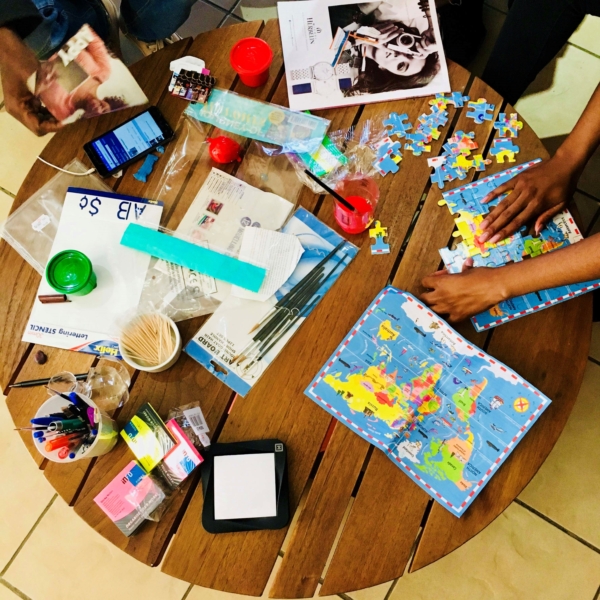
160 Characters
The 160 Characters Project is aimed at creating a new research framework for understanding the potential of mobile messaging for the treatment of mental health. An interdisciplinary method, the framework uses a combination of ‘six voices’ to provide new insights into the mental health and wellbeing needs of adolescents living with HIV.
Published on Aug 17, 2018
160 Characters
The 160 Characters Project is aimed at creating a new research framework for understanding the potential of mobile messaging for the treatment of mental health. An interdisciplinary method, the framework uses a combination of ‘six voices’ to provide new insights into the mental health and wellbeing needs of adolescents living with HIV.
Published on Aug 17, 2018


What is between these characters? What could these texts between three adolescents living with HIV show about how to deal with the big challenges of Global Mental Health?
The 160 Characters Project is aimed at creating a new research framework for understanding the potential of mobile messaging for the treatment of mental health. An interdisciplinary method, the framework uses a combination of ‘six voices’ to provide new insights into the mental health and wellbeing needs of adolescents living with HIV.
The project is built on the success of Project Khuluma, a text-based support group model for South African adolescents with HIV. Khuluma is an innovation aimed at making psychosocial support accessible for adolescents via private mobile phone messaging groups. Since Khuluma’s launch in 2012, over 60,000 text messages have been generated. This data set provides a unique opportunity to gain insights into the mental health of adolescents living with HIV and their social and psychological needs outside of the current medical remit.
160 Characters was launched through a workshop held in London in September 2017. The workshop was the first step toward a pioneering research framework for analysing Khuluma’s data set. The project was subsequently funded by UCL Grand Challenges Adolescent Lives Stream, to run a series of workshops in London and South Africa.
Indeed last week, UCL Global Health Research Fellow, Dr Geordan Shannon ran a participatory workshop in collaboration with SHM’s South Africa Team. The workshop involved 10 Khuluma adolescent mentors in a participatory research cycle to define the key themes in the data, and co-design the next iteration of the Khuluma model.
Following the workshop in South Africa, SHM will host a workshop with experts from medical science, the arts, humanities and technology in London on August 17th. In this meeting, ‘six voices’ will present insights gained since 160 Characters 2017 launch and will continue the work of developing new and more effective approaches to mobile mental health support.
Below, three of 160 Characters' team share their insight into the project and the opportunity this presents for the future treatment of mental health.

Nikita Simpson
I'm a project manager at the SHM Foundation's London office, and have been working on different versions of the peer-to-peer mobile support group model in South Africa and Zambia. I'm also a PhD researcher in Anthropology, currently conducting my ethnographic fieldwork in rural India... So when I first read the 60 000 text messages generated by HIV+ adolescents through project Khuluma, we saw huge potential to generate unique insights about the adolescent experience of living with HIV - facing stigma, deciding on disclosure, everyday anxiety and barriers to adherence.
Over the past few years, the Khuluma team and I have puzzled over which methods we should use to crack the messages. We've tried 'small data' methods that focus on the social dynamics, language and grammar of participants; and 'big data' methods that use algorithms and systems to extract trends in the groups. However, we've realised that no single method takes you far enough in understanding what is effective about the model.
So, in 2017 we experimented with bringing these methods together. We held a workshop where we invited experts from different fields and challenged them to come up with an innovative, mixed methodology for analysing the text message data. Together, we designed the six voices framework that involved approaching the data from six perspectives informed by - technology, implementation, literature, anthropology, medical science and participation in the groups themselves. This month, we'll bring together experts in each of these areas in a workshop funded by UCL Grand Challenges. Workshop participants have been given two extracts of Khuluma text message data, and asked to approach that data from the perspective of their 'voice'. During the workshop we'll validate their insights, extract themes and define the process by which these voices can be integrated.

Geordan Shannon
I'm a medical doctor and academic at the Institute for Global Health, University College London, and lead of the Stema health system innovation project [www.stema.org]. My work involves travelling off the beaten track to innovate solutions to some of the world’s most pressing health problems, including cervical cancer, violence against women, and non-communicable diseases. I also co-founded Global Health Disrupted, an international grassroots movement that supports local leaders, partners with communities, and takes creative approaches to improving health around the world. We use art in the planning, implementation and evaluation of community-driven health efforts.
Last week, I travelled to Pretoria to meet a special group of young people: the Khuluma Peer Mentors. The Khuluma Peer Mentors are a group of 10 adolescents living with HIV, who lead Khuluma peer-to-peer support groups to support the mental health and wellbeing of other young living with HIV in South Africa. They are the heart of the 160 Characters project, helping guide insights into the current project, and will help us understand what works, and why and how to improve the service for future users. The Pretoria workshop used creative strategies to engage and inspire. For example, the Peer Mentors acted out in front of the group their future aspirations and interests - as a photographer, as a doctor, as a poet - and discuss their visions and hopes for Khuluma. We also ran a competition to build a futuristic, improved Khuluma model using lego, plasticine, collage, cardboard, glitter, glue, and props like toy phones, houses, cars, and dolls. This helped us understand what is important to the Khuluma adolescents in a fun and creative way.

Malebo Ngobeni
I am a Project Manager for SHM Foundation in South Africa. My background is in Psychology and I started working with the SHM Foundation as a Project Co-ordinator in 2013, responsible for the recruitment and over-sight of Khuluma on the ground. In the past I have worked on projects that provided face to face support for people living with HIV, but Khuluma was the first time I was involved in a technology-driven mental health programme.
The process of training mentors started five years ago when participants in the project had found it so helpful in their lives that they did not want the programme to end. From that came the mentorship aspect of Khuluma - today the programme has grown and we have 25 mentors, the oldest of which is 23 years old and has been a part of the team for five years!
Thanks to the support of Khuluma, mentors are able to feel that they are the experts of their own lives and are able to offer support to others living with HIV. Mentors are easily able to see beyond what is said in a text because they have lived many of the experiences that are being discussed. This type of data is normally analysed by experts from the outside, but 160 characters will give the mentors the opportunity to engage with the texts from an outsider’s position, conducting their own analysis with the other ‘voices’ involved. As mentors they are present when the texts are coming into their groups, but I don’t think they have ever really had the chance to step back and reflect on all of the data.
The desire to scale up is felt by mentors who have seen how successful the programme has been in their lives. 160 Characters is a chance for them to show us what else needs saying (and doing!). Not only will their insights change how the technology is structured and groups facilitated, but through 160 Characters they will be able to show how we as facilitators on the ground, and themselves as mentors can best read and approach what is said and what is left between the lines.
Published on: 17-08-2018

Contact Us

Have a challenge you think we could help with? A project you'd like us to collaborate on?
Just want to say hi? Reach out - we love meeting new people